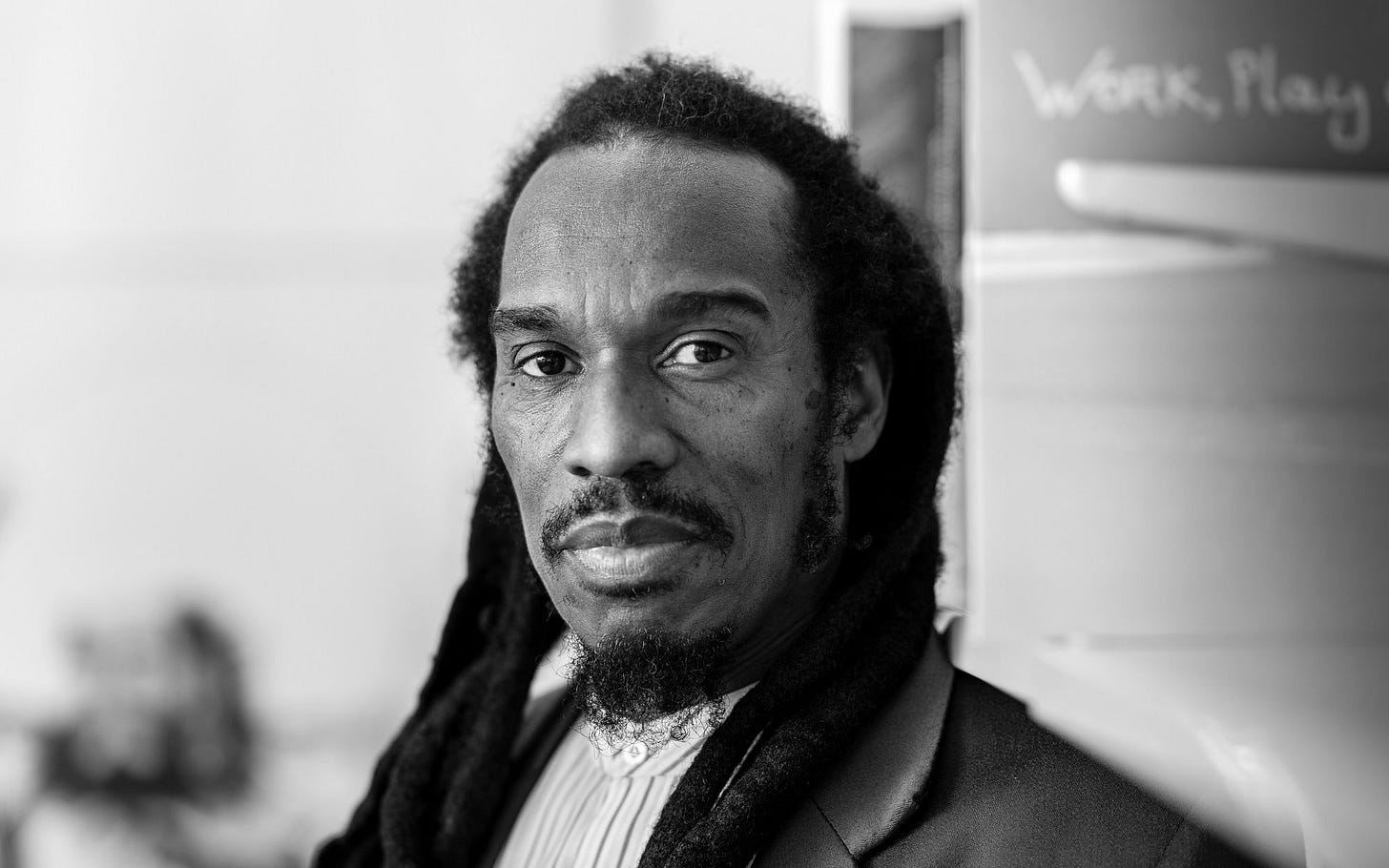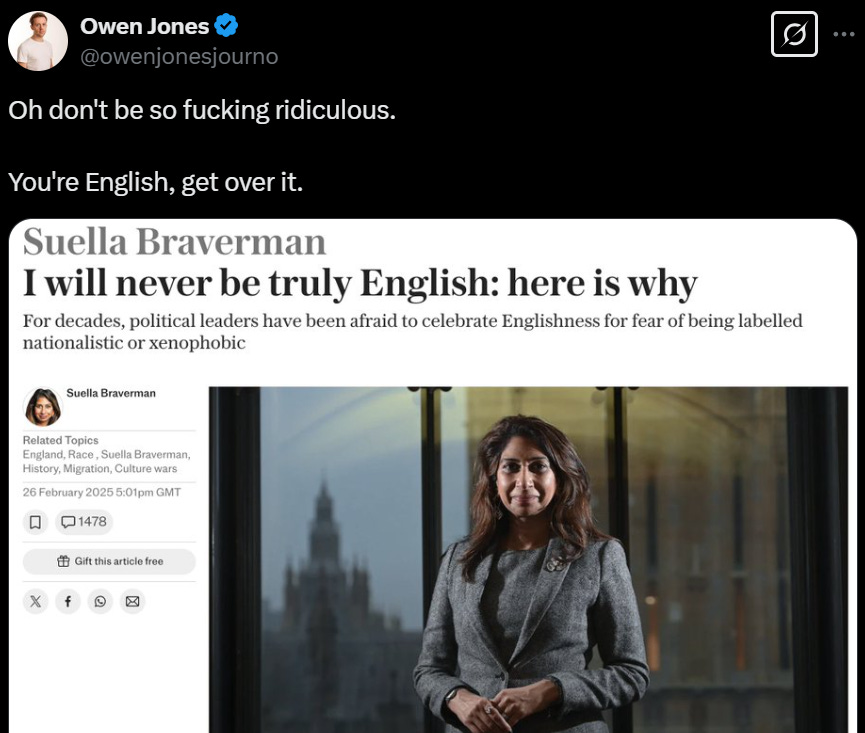I am not English, and I don't need to be
Are Suella Braverman and Rishi Sunak English? I reflect on my own identity to provide an alternative response to the culture war: centring universal humanity, not universal Englishness
There’s No Place Like Handsworth
I was raised in Handsworth, Birmingham; the same area renowned poet Benjamin Zephaniah grew up, the same area that spurred his life long commitment to Black liberation. Handsworth is the home of roots reggae band Steel Pulse, whose 1978 hit Handsworth Revolution decried the daily indignities of Black life in Babylon, and called for Handsworth to rise up for justice. Handsworth was a hub for Black liberation struggles. The same park that hosted the Black summer festival I loved as a child was the site of the first African Liberation Day in 1977. None of this should be a surprise: Handsworth was a landing place for the Windrush generation who arrived expecting streets paved with gold, but were greeted with racial segregation and discrimination.
I am immensely proud of being from Handsworth; there is nowhere in the world I’d rather be from. I wish I had a much stronger Brummie accent than I do, so I could lay claim to my roots every time I spoke. I love the English cities I’ve lived in; I love the people I’ve met in them even more. And yet, I have never considered myself English.
I still have a strong memory of celebrating the Queen’s jubilee in primary school; it must have been the golden jubilee of 2002. We were taken on a procession through the streets of Perry Barr singing “Q-U-E-E-N the Queen’s jubilee, let us celebrate the Queen’s jubilee”. So I was clearly being given a sense of national identity at school.
But being English was never something we revelled in at home. Maybe other Black folk did. In my house not much was made of racial or national identity. We ate Jamaican food, we listened to 90s RnB, but mostly my mom got on with making her way through working class life. We were Black, we were Jamaican, we were Brummies, perhaps we were British. I had the added complexity of being born in New York, so when I felt like being cool and unique I was also American. But never English.
My sense of identity is a product of the complex histories of racism, colonialism and slavery. I can’t tell you much about my ancestry. I have a Scottish surname, so at some point my family was probably connected to a Scottish slave owner. I have two Jamaican parents. I was called a “Paki” by some white youths in Walsall. Truth is, there aren’t that many Black people in Britain, and our history here is fraught with the legacies of colonialism; growing up I always had a niggling sense of being somehow outside of the nation.
For some Black folk this ancestral movement, and uncertainty, creates a pull towards national identity; of wanting your sense of self to be rooted where you are. For others, this creates a yearning for homelands we were violently wrenched from, or forced to leave. Perhaps national identity is purely logistical: I’ve got a British passport, so I’m a Brit. Or, having one white parent means you are both English, and other. Some people claim a national identity just to stick it to the racists. The reality is messy and complex. I asked my Black and Asian friends how they see this: many feel the same. I have plenty of white friends who wouldn’t care to identify as English, and prefer to identify as Marxist, or working class. Identity is not so simple. Given this, how do we respond to right wing narratives claiming Rishi Sunak and Suella Braverman can never, truly, be English because they also happen to be brown?
To Be English
First let’s state the obvious. When the right, and racists, claim Rishi Sunak isn’t English they are manoeuvring within the culture war. Two connected claims are being made. First, that anyone with a migrant background and brown skin has dual loyalties: they’re never going to be truly of this country because they have generational roots elsewhere. Second, they’re trying to construct a pure, white, English ethnic identity connected to, but distinct from, national identity. Onto this pure English ethnicity they write a new victimhood: of white people being left behind in their own country.
Both claims aim to achieve the same thing: they create a domestic conflict between opposing groups; where one is deserving of rights and freedoms, political and economic prioritisation, and power and influence. While the other is not. This forceful exclusion from English identity is part of right-wing identity politics: it seeks to splinter solidarity and class based identities by creating increasingly hostile racial and national identities.
Some on the left have responded with forceful inclusion: for example Owen Jones claiming that, against her own pronouncement, Suella Braverman is English. Suella’s claim - that she can never truly be English - is cynical: she’s identified as English at other times, and is clearly trying to shore up the idea of a pure, white, English identity for her own right-wing agenda. But what would Owen say to me, and the many other Black, Kashmiri, Palestinian friends I have who have grown up here but don’t consider ourselves English? Must I be English because it’s politically convenient for the left?
Universal Humanity, Not Universal Englishness
There’s a better argument here: universal dessert that emerges out of universal humanity. There’s always been a strong impulse to say gay people are born gay; it’s an immutable characteristic so, surely, I shouldn’t be punished for something I can’t control, or change? In fact, Western gay identity is fairly new (even though sex between the same gender is ancient): it emerged out of the urban centres of the industrial working classes. Sexuality can change throughout your life. As much as we’d like sexual identity to always be fixed and unchangeable, so it’s more convenient for our arguments, sometimes it’s not. And that’s fine. Rights shouldn’t be based on what we can or can’t change about ourselves, but on our universal, unconditional humanity.
We are here because you were there - Ambalavaner Sivanandan
The right are trying to construct a similar argument in reverse: people with brown skin have immutable characteristics that mean they can never truly be English, so they shouldn’t be afforded the same rights and freedoms as ‘real’ English people. Countering this by forcefully boxing everyone into an English national identity accepts the right-wing terms of debate: yes, only English people should have certain claims in this country, but don’t worry the brown folk are English too!
Of course this only works if, like me, you are second or third generation and eat, sound, dress and pub like a Brit. Accepting this premise inadvertently denies the humanity, rights and freedoms of those newly arrived, who don’t have the cultural markers that allow them to lay claim to a national identity. We shouldn’t fall into the trap of tacitly surrendering migrants to the right-wing culture war.
Instead we should say: we are here because you were there, and my history is as tied to this island as anyone else’s. I might have a claim to national identity, if that’s what I choose. But I have an even greater claim to rights and freedoms in this country because I’m alive, and because I’m human - whether or not I’m English too.






Thank you for the very interesting thoughts.
I'm in the US, for context... but I wrestle with these concepts a lot myself. I grew up identifying as generally "Hispanic" (I don't use that term anymore) but feeling fairly disconnected from both my Mexican and indigenous ancestry. I've never been to Mexico or South Dakota (where my Native American family members are from and some still live), and I don't speak Spanish nor Lakhota, and I know most aspects of my ancestral cultures by secondhand only (unless liking certain foods counts)... So I don't feel I'm "entitled" to claim anything about what makes me non-white/POC (another term I'm tired of). Despite the literal blood relations, I have never felt rooted to anyone or anything in those ways some people do. So all of this probably contributes to why I think the notion of individual identity in general is very over emphasized by many people, in a way that keeps us from connecting on the more universal levels. I just can't relate to a lot of it, personally.
Great article. Can I ask that if the umbrella category of British or Black British didn’t exist do you think you’d be more inclined to claim or at least contest an English identity?